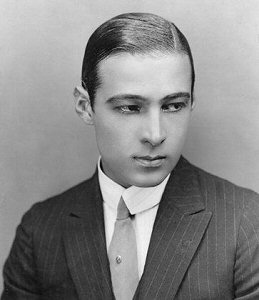 Rudolph Valentino born 6 May 1895 (d. 1926)
Rudolph Valentino born 6 May 1895 (d. 1926)Born Rodolfo Alfonso Raffaello Piero Filiberto Guglielmi di Valentina d'Antoguolla in Italy, he arrived in the US in 1913 and eventually became a taxi dancer and instructor, and eventually, an exhibition dancer. He made his way across the country to California, where he played a number of small parts in silent movies. He was impressive enough to be cast as the lead in The Four Horsemen of the Apocalypse (1921); the film was a success and made him a star. Later the same year, The Sheik made him a legend.
In 1926, he collapsed with a perforated ulcer; after an apparently successful operation peritonitis set in and 8 days later, the greatest romantic hero of the silent era was dead. He was just 31 and had been a star for a mere five years.
 100,000 distraught women swarmed his funeral, and many rumours abound, but male audiences were offended by Valentino's extravagant dress, colourful spats, make-up, and willingness to display his body on screen. Valentino disrupted his era's rigid codes of sex and gender.
100,000 distraught women swarmed his funeral, and many rumours abound, but male audiences were offended by Valentino's extravagant dress, colourful spats, make-up, and willingness to display his body on screen. Valentino disrupted his era's rigid codes of sex and gender.Although his legendary star status is assured, his legacy of work died with the silent film era and while he retains an extraordinary beauty, glamour and allure on screen, his body of work is insufficiently substantial to stand among cinematic greats - like his style of acting, Valentino's work is frozen in time and almost incomprehensible to modern viewers with the heavy make-up and exaggerated mime and melodrama of silent acting
Accused at the time of downgrading masculinity with his perceived effeminacy, time has not been kind and Valentino seems as camp now as then.
Valentino's sexuality remains ambiguous, but rumours of his homosexuality were rife among Hollywood gay circles, despite (or because of) his marriages to and divorces from Jean Acker and Natacha Rambova, both lesbian.
